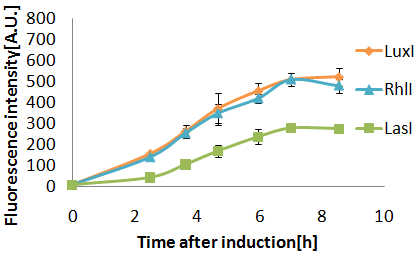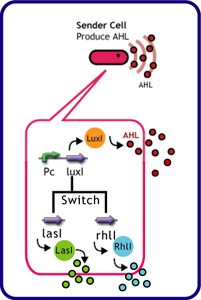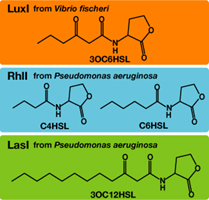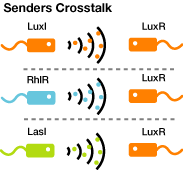Team:Chiba/Sender experiments
From 2008.igem.org
| Home | The Team | The Project | Parts Submitted to the Registry | Reference | Notebook | Acknowledgements |
|---|
Signal molecule sender
Design
Each species has their own LuxI-type proteins,which synthesize their specific autoinducers,AHLs.AHLs produced by different LuxI-type proteins differ only in the length of the acyl-chain moiety and substitution at position C-3.LuxR,which is original for Vibrio fischeri,is activated by its cognate autoinducer,3OC6HSL.However,LuxR is also activated by non-endogenous molecules,C4HSL,C6HSL,and 3OC12HSL.Activation by non-endogenous molecules requires a higher signal concentration(2).This results in slower activation of receivers,when AHL concentration is increasing.
Experiment
To Confirm that communication using non-endogenous molecules results in slower activation of receivers.
冨永
Senders
Receiver
Method
1.Crosstalk test
To characterize quorum sensing crosstalk, constitutive AHL senders were mixed with constitutive receivers and measure fluorescence intensity.
- Transformed Senders into E.coli strains(XL10GOLD) and Receiver into E.coli strain(JW1908).
- Inoculated them independently in liquid media. Incubated at 37°C 12h
- Mixed them.
- Incubated at 30°C.
- Measured intensity of green fluorescence at regular time intervals.
Result and Discussion
目視実験
- 試験管内の培養液(2mL)が、緑色を呈しているときの蛍光強度:150~200。
--Masahiro 07:16, 29 October 2008 (UTC)
Senders(JW1908),T9002(JW1908)@37°C菌数(μL)、Sender:Receiver=500:500,100:1000,10:1000
- CinI+LVAとLuxRのクロストークはどの菌数比でもおこらない。
- RhlIが(RhlI+LVA、LasI、CinI+LVAの中で)一番クロストークする。
- Sender同士のクロストークの時差(蛍光強度200に達するまでの時間)は、1時間以下の範囲でしか発生しなかった。
Senders(JW1908),T9002(JW1908)@30°C菌数(μL)、Sender:Receiver=500:500,100:1000,10:1000
- 特に37°Cで行ったときと差はない
- BWはクオラムセンシングをしやすい株なので、Senderを変えてもたいした時差が見られなかった。
- 次回からはSender側の株をXL10Gに代えて実験を行う。
Senders(XL10Gold),T9002(JW1908)@37°C菌数(μL)、Sender:Receiver=500:500,100:1000,10:1000
- SenderをBW株にして行った実験よりも、8時間後の蛍光強度が平均で200くらい落ちた。
- この条件ではLasIのクロストークは起こりにくい。
- (8h後の最終蛍光強度(菌比1:1)、LasI:LuxI(Ptet):RhlI:RhlI+LVA=163:267:394:325)
Senders(XL10Gold),T9002(JW1908)@30°C菌数(μL)、Sender:Receiver=500:500,100:1000,10:1000
- 37°Cで行った実験と比べ、LasIが活性。(8h後の蛍光強度、37℃:30℃=163:245)
- LasとLux(Plac)1:1で蛍光強度200に達するまでの時間に2.5時間の時差がみられた。
- Rhlのタグなしとタグ付きの差は、8h後の最終強度にしか現れなかった。
- また、差が一番でたのが30°Cで行ったこの実験で、タグなし:タグつき=507:456。
Senders(XL10Gold),T9002(JW1908)@25°C菌数(μL)、Sender:Receiver=500:500,100:1000,10:1000
- どのSenderもGFP強度20~50の範囲。ネガコン(T9002のみ)の値、40前後と変わらず。
(ただし、静置培養のため、しんとう培養した30℃や37℃とは条件が違う。)
--Yoshimi 06:14, 29 October 2008 (UTC)
--Masahiro 07:47, 29 October 2008 (UTC)
Conclusion
3OC6HSL,3OC12HSLに対する、LuxRの応答時間に、二時間の差ができた(3OC12HSLの場合、3OC6HSLに比べて二時間遅れて応答する)。 そのときの条件は、培養温度30°C、genelatorの株はXL10Gold,Receiverの株はJW1908のとき、であった。

--Masahiro 09:30, 29 October 2008 (UTC)
| Home | The Team | The Project | Parts Submitted to the Registry | Reference | Notebook | Acknowledgements |
|---|
 "
"



